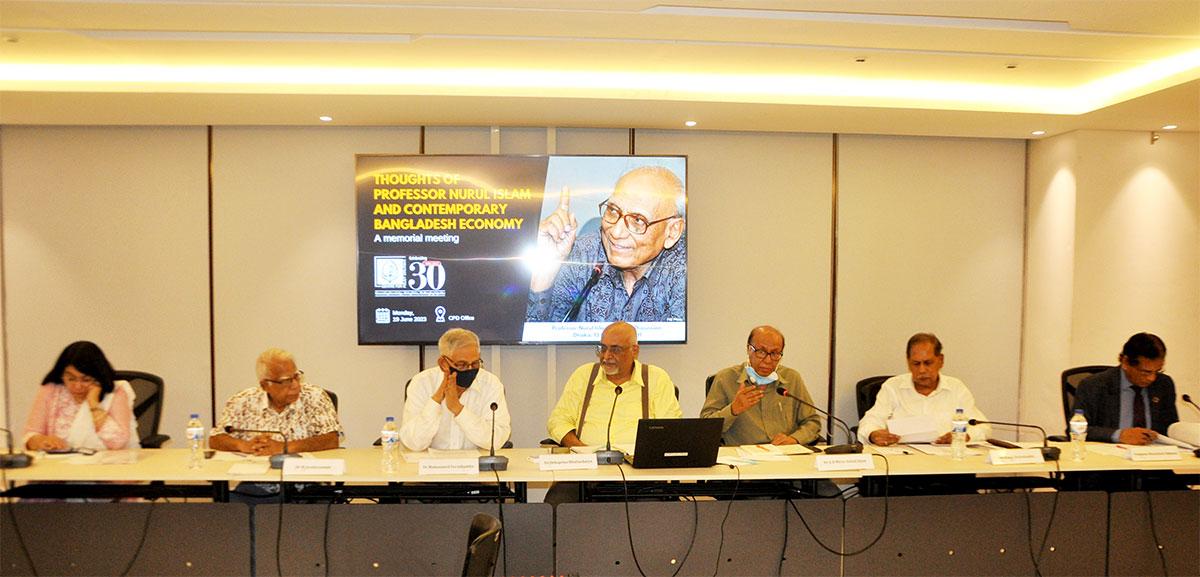
Professor Nurul Islam was an eminent economist, a fervent patriot and the first Deputy Chairman of Bangladesh Planning Commission. He was one of the key figures in the struggle for the country’s independence. The economist passed away on 8 May 2023. His most monumental contribution lay in shaping the economic rationale for the country’s liberation and his active participation in the independence movement. Professor Islam was a close aide to Bangabandhu Sheikh Mujibur Rahman and made a significant contribution to the Six-Points Programme, which paved the way for independence.
To pay tribute to his extraordinary heritage and uphold his ideas, the Centre for Policy Dialogue (CPD) organised a discussion session titled ‘Thoughts of Professor Nurul Islam and Contemporary Bangladesh Economy’ on Monday, 19 June 2023 at the CPD premises. The session was moderated by Dr Debapriya Bhattacharya, Distinguished Fellow, CPD.
Dr Fahmida Khatun, Executive Director, CPD, at her introductory remarks, said, ‘Throughout his illustrious career, Professor Islam authored numerous books, research papers, and journal articles. His publications not only showcased his extensive experience in national and international policymaking but also offered valuable insights and actionable perspectives on advancing Bangladesh’s economy.’
Dr A B Mirza Azizul Islam, Former Advisor to the Caretaker Government and Professor, BRAC University, said, ‘The profound teachings of Professor Islam on international trade have been invaluable to me throughout my career and academic journey’. While discussing Professor Islam’s view on the role of foreign aid, he said Professor Islam emphasised the importance of disciplined utilisation, reflecting his belief that foreign aid should be effectively managed and allocated.
‘Professor Nurul Islam played a pivotal role in getting Bangladesh enlisted as a Least Developed Country (LDC) at the World Trade Organisation (WTO), marking a significant achievement for the country,’ said Dr Mohammed Farashuddin, Former Governor, Bangladesh Bank and Chairperson, Board of Trustees and Advisor and Coordinator Department of Economics, East West University. Many of the thoughts and insights of Professor Islam have been reflected in the first 5 year plan of the country, added Dr Farashuddin.
Commenting on Professor Islam’s contribution to economics, Dr Quazi Shahabuddin, Former Director General, Bangladesh Institute of Development Studies (BIDS), said, ‘He implemented a comprehensive modernisation of the economics department’s syllabus at the University of Dhaka, ensuring that contemporary issues were rigorously studied and incorporated into the curriculum.’
Dr M Asaduzzaman, Former Research Director, BIDS said that Professor Islam, in his lifetime, talked a lot about political economy and inequality. While discussing about contemporary issues he added ‘Bangladesh is still suffering from gender inequality. Issues like unpaid labour of women need to be addressed if we want a transition towards the development of this country’.
Professor Mustafizur Rahman, Distinguished Fellow, CPD, emphasised the enduring relevance of Professor Islam’s observations on free-trade agreements. He asserted that Professor Islam’s statement, “A free-trade agreement may not yield significant benefits for a country if it fails to convert its comparative advantages into competitive advantages,” remains highly pertinent in the present context.
Dr Rushidan Islam Rahman, Executive Chairperson, Centre for Development and Employment Research and Former Research Director, BIDS, discussed about his work on inequality and said, “In order to address the pervasive inequality in Bangladesh, it is imperative to gather comprehensive data from all sectors in order to identify and understand its underlying causes”.
While discussing his interactions with Professor Islam, Ambassador Dr Toufiq Ali, Former Permanent Representative of Bangladesh to the WTO and UN Agencies said, ‘On occasions that I saw him, he said he was working on giving the economic implementation plan for the Six-Points Programme. He told me that he was not alone in the process as Professor Rehman Sobhan among many others were working with him. Professor Islam said the implementation of the Six-Points Programme on the economic side meant effective break up of Pakistan’.
‘He had a really great capacity to argue different points of an issue. He would always ask the right questions and argue to get to the truth of the matter’, said Dr Roumeen Islam, Senior Economic Advisor IFC – International Finance Corporation, while reminiscing her departed father.
Professor Rehman Sobhan, Chairman, CPD, said “Nurul Islam was the manifestation of what Amartya Sen wrote in his book ‘The Argumentative Indian’, in which he developed the concept drawn from the ancient philosophers of public reasoning. Professor Islam believed that issues of the world should be addressed by conversation and reasoning rather than violence.”
The event was attended by people close to Professor Nurul Islam, his family members and relatives, students, economists and journalists.

